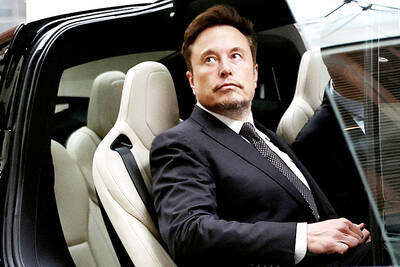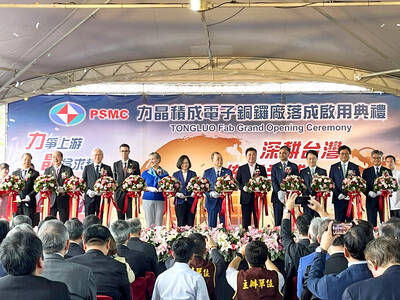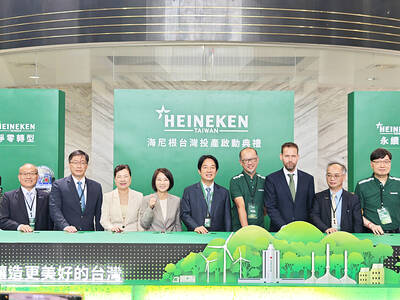Sales in the food and beverage sector last year rose 18.8 percent from a year earlier to NT$1.03 trillion (US$32.9 billion), the highest ever, with sales last month expanding for the 20th consecutive month, the Ministry of Economic Affairs said on Tuesday.
Last month’s sales increased 7.5 percent to NT$94.1 billion from a year earlier as restaurants and beverage outlets benefited from holiday consumption, special sales promotions and new brand launches, the ministry said in a report, adding that catering services were boosted by demand for in-flight meals as airlines increased flights.
The sector is expected to perform well this month during the high season for corporate gatherings, but sales might be lower than a year earlier due to a high comparison base, the ministry said, adding that sales are projected to fall by 3.2 percent to 6.2 percent annually.

Photo: CNA
Meanwhile, sales in the retail sector last year rose 6.9 percent year-on-year to NT$4.58 trillion, also the highest on record, as they increased last month for the 28th consecutive month, the report showed.
Last month’s sales rose 1.1 percent to NT$407.5 billion, but the pace of growth was slower than the previous month’s 7.2 percent and also missed the ministry’s estimate of 2.8 percent to 5.8 percent due to weaker purchasing of general merchandise and vehicles, as well as falling demand for clothes and consumer electronics, it said.
The ministry expects the retail sector’s growth momentum to persist this month thanks to strong consumer spending ahead of the Lunar New Year holiday, with sales estimated to grow 0.3 to 3.3 percent annually, it added.
As for the wholesale sector, sales last year totaled NT$11.77 trillion, the third-highest on record, but the number dropped 7.3 percent from a year earlier and marked the second-largest annual decrease ever, the report said.
As the sector’s sales last month were down 2.4 percent from a year earlier and its outlook is linked to external demand, with no signs of an immediate demand recovery for machinery equipment, building materials and chemical goods, the ministry expects sales this month to be lower than last month as it is a low season for consumer electronics, it said.
However, sales this month might be higher than a year earlier due to increasing demand for artificial intelligence applications and more working days, rising by 2.4 percent to 5.4 percent annually, the ministry said.

purpose: Tesla’s CEO sought to meet senior Chinese officials to discuss the rollout of its ‘full self-driving’ software in China and approval to transfer data they had collected Tesla Inc CEO Elon Musk arrived in Beijing yesterday on an unannounced visit, where he is expected to meet senior officials to discuss the rollout of "full self-driving" (FSD) software and permission to transfer data overseas, according to a person with knowledge of the matter. Chinese state media reported that he met Premier Li Qiang (李強) in Beijing, during which Li told Musk that Tesla's development in China could be regarded as a successful example of US-China economic and trade cooperation. Musk confirmed his meeting with the premier yesterday with a post on social media platform X. "Honored to meet with Premier Li

ARTIFICIAL INTELLIGENCE: The chipmaker last month raised its capital spending by 28 percent for this year to NT$32 billion from a previous estimate of NT$25 billion Contract chipmaker Powerchip Semiconductor Manufacturing Corp (力積電子) yesterday launched a new 12-inch fab, tapping into advanced chip-on-wafer-on-substrate (CoWoS) packaging technology to support rising demand for artificial intelligence (AI) devices. Powerchip is to offer interposers, one of three parts in CoWoS packaging technology, with shipments scheduled for the second half of this year, Powerchip chairman Frank Huang (黃崇仁) told reporters on the sidelines of a fab inauguration ceremony in the Tongluo Science Park (銅鑼科學園區) in Miaoli County yesterday. “We are working with customers to supply CoWoS-related business, utilizing part of this new fab’s capacity,” Huang said, adding that Powerchip intended to bridge

Dutch brewing company Heineken NV on Friday announced an investment of NT$13.5 billion (US$414.62 million) over the next five years in Taiwan. The first multinational brewing company to operate in Taiwan, Heineken made the statement at a ceremony held at its brewery in Pingtung County. It also outlined its efforts to make the brewery “net zero” by 2030. Heineken has been in the Taiwanese market for 20 years, Heineken Taiwan managing director Jeff Wu (吳建甫) said. With strong support from local consumers, the Dutch brewery decided to transition from sales to manufacturing in the country, Wu said. Heineken assumed majority ownership and management rights

Microsoft Corp yesterday said that it would create Thailand’s first data center region to boost cloud and artificial intelligence (AI) infrastructure, promising AI training to more than 100,000 people to develop tech. Bangkok is a key economic player in Southeast Asia, but it has lagged behind Indonesia and Singapore when it comes to the tech industry. Thailand has an “incredible opportunity to build a digital-first, AI-powered future,” Microsoft chairman and chief executive officer Satya Nadella said at an event in Bangkok. Data center regions are physical locations that store computing infrastructure, allowing secure and reliable access to cloud platforms. The global embrace of AI